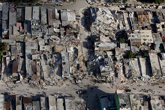Haiti ‘Year Zero’: The Afro-Americas and Africa

Haiti’s earthquake has provided the first opportunity since slavery for slavery descendants in the Afro-Americas to alter and recreate the country’s socio-economic structures and physical infrastructure, writes Marian Douglas-Ungaro. But will former slave-owners and colonial masters hinder or assist with the process, Douglas-Ungaro asks, and will continental Africa notice or care?
I seem to be moving beyond the phase of waking up wondering if what happened in Haiti on 12 January 2010 was a terrible dream or a reality. It is all too real, and will remain so the rest of our lives.
In the early to mid-1990s there was a sustained period in my life when I thought of Haiti, and the US-Haiti relationship, every day. Then somewhere in the mid to late 1990s I wound up working on the ‘other side’ of the world and didn't return to the Americas until 2005. But after 12 January 2010, I doubt that Haiti will ever again be out of my thoughts in quite the same way.
For this writer it is hard to express what the people, nation and history of Haiti mean to many or most of us who are the Afro-descendants of the Americas. It seems it has taken an unprecedented catastrophic event within Haiti, under her very feet, for her and the Afro-Americas to finally get Africa to look west toward us on the Middle Passage side of the Atlantic Ocean.
After the earthquake, on Twitter.com, I noticed Haitian radio broadcaster Carel Pedre (@carelpedre) was the first person I observed using this term ‘Haiti Year Zero’ in one of his tweets. It seems an appropriate reference to an event – now a series of events – at once cataclysmic yet creating an historic opportunity to re-set, to change, to re-build.
For the Afro-Americas, what has happened in Haiti is the first time since slavery that we, the Slavery Descendants, have such an opportunity to alter and re-create socio-economic structures (which go back to slavery) as well as physical infrastructure. Hopefully without another sacrificial earthquake, we the Afro-descendants of the Americas need a new beginning – or at least an identifiable transition – as much in Colombia, Mexico, Bolivia and the United States of America – as we do in Haiti. And yet, since 1791 Haiti has carried the banner for the Afro-descendants. After 12 January, will the ex-slaveowners and colonial masters hinder or assist us? Will Continental Africa notice or care?
We note hopeful signs: President Abdoulaye Wade has nominally offered Haitians re-settlement in Senegal. Yet he also publicly ridiculed our reparations for enslavement. More encouraging, Ghana has pledged several million dollars in assistance to Haiti. We thank Senegal for the thought, and Ghana for the pledge of material solidarity.
At the same time too many people, countries and organisations still are most comfortable with, and often part of, a morbidly negative international dialogue and dynamic which re-ignites itself almost any time Haiti (or the Afro-Americas more generally) is mentioned.
This tendency makes it challenging, at best, to make fundamentally hopeful or forward-thinking plans in almost any Black society of the Americas. Interacting with those outside our own communities is excruciatingly hard when so many people and institutions we encounter are used to getting what they want, and they have cultivated incredibly patronising and ultimately destructive ways of viewing and framing us, our societies and our experiences.
Just as bad as the above is increasingly encountering the ‘history-neutral’ interlocutor for whom neither Haiti nor the Afro-Americas is a meaningful ‘reality’. In contradiction of her own, obvious history vis-a-vis the Afro-descendants of the Americas, in ways Continental Africa, de facto, falls into this category. ‘Out of sight, out of mind’, goes the saying in English.
From my own experience – at home in the Americas, in Europe, and in Africa – I do not know that the history (whether post-Africa or when we still were in Africa) and status – in fact, the very existence – of the Black societies of the Americas are either serious or frequent topics of thought (let alone action), back on the Continent (i.e. Africa, not Europe).
I'm not even convinced, for example, that there exists a pan-African and gender-inclusive journal about the Afro-Americas. While I admit not knowing which continental African country first sent a diplomatic delegation to my hometown, Washington, DC, I am pretty sure that up to the present, no African country has yet become an observer country at the Organization of American States. The OAS is the world's oldest regional international organisation and includes as its member countries almost all societies of the Americas (with the notable exceptions of several still possessed by Europe). And despite the US now having a president from (slaveowning) white American and Kenyan Luo families, Caribbean neighbour Cuba remains ‘on suspension’ in the OAS ever since the 1959 Cuban revolution.
One can only hope that post-earthquake, Haiti, the Afro-Americas and continental Africa will work and cooperate to give a badly needed fresh, new meaning to the term ‘trans-Atlantic relationship’, and that Africa's gaze toward us – the Afro-Americas – becomes more consistent, more balanced, and will not fade yet again.
BROUGHT TO YOU BY PAMBAZUKA NEWS
* Marian Douglas-Ungaro is a writer and international consultant who has worked in Haiti, Burundi and elsewhere. She manages the Facebook group AFRO-AMERICAS, for the Afro-descendants of the Americas.
* Please send comments to [email protected] or comment online at Pambazuka News.
